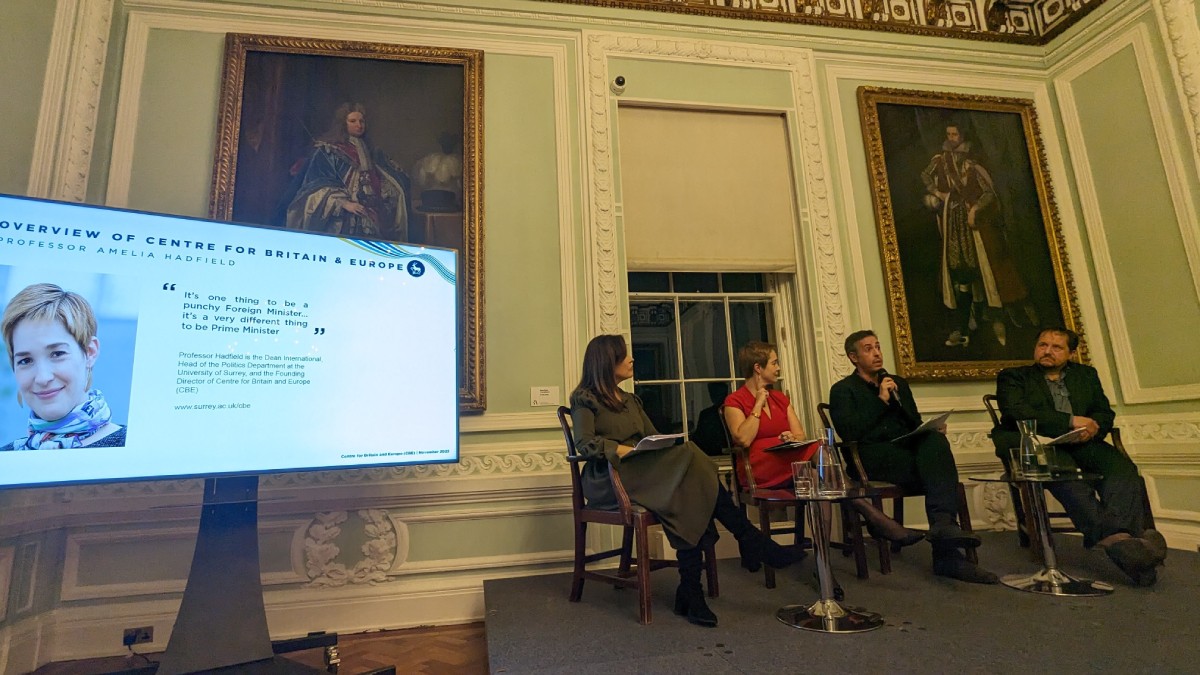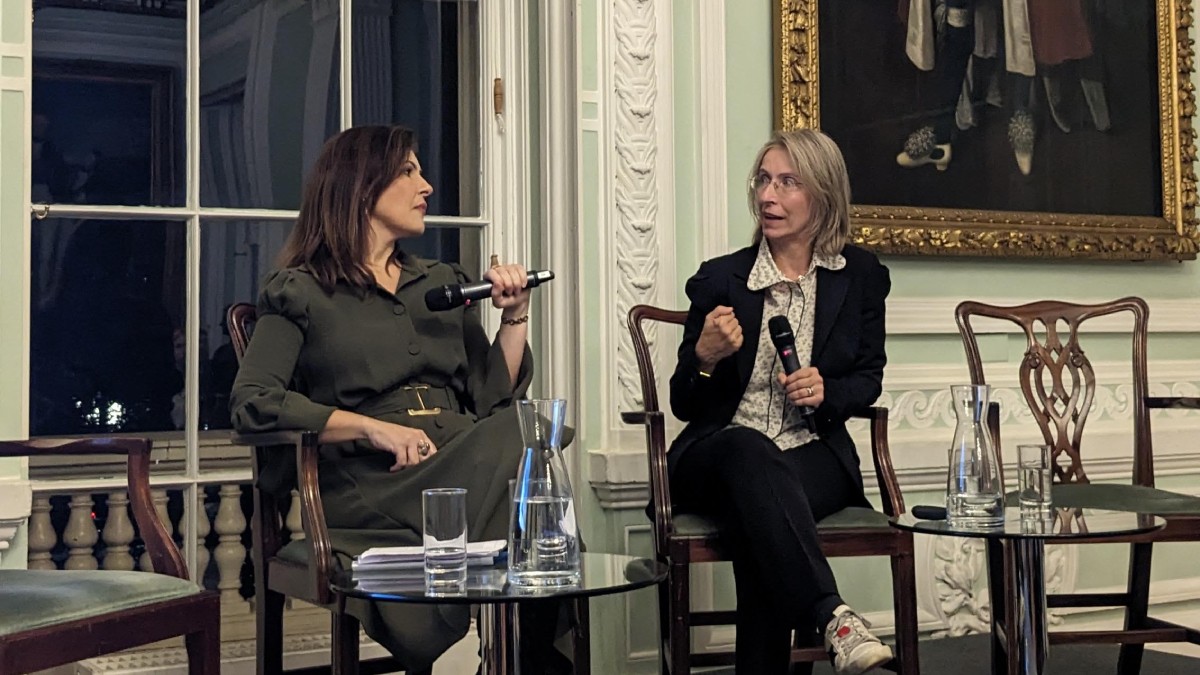University of Surrey’s Centre for Britain and Europe celebrates four years of research, teaching and activities
The Centre for Britain and Europe (CBE) was founded in 2019, building on the Centre of Research on the European Matrix (CronEM) at the Department of Politics of the University of Surrey.
Jean Monnet: Centre of Excellence
In 2020, as a result of a heritage of teaching and research excellence in European and UK affairs, and on the basis of an ambitious plan to establish itself as an authoritative voice on UK-EU debates, the CBE was granted a Jean Monnet: Centre of Excellence designation by the European Commission: the gold standard in scholastic and research outputs.
The CBE’s activities were structured on the 5 pillars of the 2020-2023 Jean Monnet grant, and aimed to research Gender and Identity, Electoral Behaviour, European and British Security and Defence, De-Europeanisation and re-Europeanisation, and Cross-thematic outputs. The latter covered the substantive themes of identity/gender, security/defense, and de/re-Europeanization. Innovative research has included the development of: the Gender toolkit: A reference guide for researchers, academics and students; oral evidence to the House of Lord’s Select Committee - on UK-EU foreign policy and defence co-operation; the forum on contemporary Eastern European conflict; The War in Ukraine: One Year On; and the major EU-funded, 11-university consortium for research on refugees and immigration, PROTECT: The Right to International Protection.
With the rapid growth of the Centre throughout 2023, the five pillars of the Jean Monnet grant now encompass a wider range of contemporary UK, EU and global affairs through its six thematic areas. These new additions are in the realm of energy and sustainability, and stakeholder engagement with the latter has emphasised collaboration and involvement with the local government in Surrey. CBE has since developed impactful projects exemplified in briefing notes on EU Energy Security and Strategic Autonomy, sustainability-themed events and workshops. Additionally, CBE provided advisory to the local government through several papers commissioned by the Surrey County Council on domestic development, including a Post-Covid Report executive summary and the significant report Charting Community-Based Growth In Surrey: Local Responses And County Drivers.
Beyond academic excellence and research, the CBE - as a Jean Monnet Centre of Excellence – has formed strong bonds with civil society, governments, research institutes and universities across the UK and Europe, with the objective of encouraging in-depth and sustainable cooperation between academics, knowledge sharing between students, and supporting the next generation of scholarship that focus on European studies.
Reconfiguring the EU’s Democracy and Support Strategy in the Eastern Neighbourhood (REDEMOS)
February 2022 marks a date that would see a groundbreaking initiative, where Professors Hadfield and Exadaktylos secured the inaugural Horizon Europe consortium grants, for a project entitled Reconfiguring the EU’s Democracy and Support Strategy in the Eastern Neighbourhood (REDEMOS). This ambitious three-year endeavour, in partnership with the Norwegian University of Science and Technology (NTNU), aims to reshape the EU’s democracy support strategy in six Eastern Neighbourhood countries: Belarus, Ukraine, Moldova, Georgia, Armenia and Azerbaijan. The project, which officially launched in January 2023, will assess past EU democracy support actions to pinpoint success factors and challenges. Its ultimate goal is to provide a practical policy toolkit for decision-makers, political actors, and civil society organisations in both the EU and the Eastern Neighbourhood. REDEMOS is effectively a research consortium with a purpose to affect policy and provide cutting edge solutions through the network of its consortium members, led by the University of Surrey and NTNU.
Having emerged as an authoritative institution in the field of EU studies, CBE eagerly anticipates further opportunities to extend its impact. The Centre is poised to continue its success and pursue further EU and UK funding in its commitment to advancing research, fostering collaboration, and contributing valuable insights to the ever-evolving landscape of the EU.
CBE at four
In celebrating CBE’s 4th anniversary, the completion of the three-year Jean Monnet project, and the first year of the REDEMOS Horizon Europe project, the CBE at Four event took place on 9 November 2023 at the British Academy in London. It was a wonderful opportunity for academics, diplomats and policymakers to come together and celebrate the wide-ranging outputs of the CBE, and to learn more about its research, teaching and externally-facing activities.
The evening was moderated by Barbara Serra, a high-profile journalist and Professor in Practice at the University of Surrey, and featured two distinguished speakers: Professor Jan Zielonka, Professor Emeritus at the University of Oxford and Professor of European Politics at the University of Venice, and Dr Federica Bicchi, Associate Professor of International Relations at the London School of Economics. They were joined by Professor Amelia Hadfield, Dean International, Head of Department of Politics and CBE Founding Director; Professor Daniele Albertazzi, Professor of Europen Politics and CBE Co-Director; and Professor Theofanis Exadaktylos, Professor of European Politics at the University of Surrey.
Keynote speaker Professor Jan Zielanka took to the stage and offered insights on the promotion of democracy and the rising issue of autocracy through the creation of networks within the European Union. He also emphasised the reconceptualisation of the role of nation states in the EU. The crux of his message centered on the proactive export of democracy, urging a reconsideration of traditional notions to adapt to the evolving dynamics within the European political landscape.
Surrey’s Professor of European Politics, Professor Theofanis Exadaktylos provided insights into the genesis of REDEMOS. He also pointed to the significance of Horizon Europe in addressing fragile democracies in Eastern Europe by noting: “REDEMOS is not just research, it's a transformative journey shaping the future of democracy support in the Eastern Neighbourhood where together, we redefine possibilities and cultivate positive change to the region.”
Subsequently, Professor Amelia Hadfield highlighted the importance of the collaboration between local government and the CBE to strengthen research on significant current issues. She enthusiastically stated that: “With the support of funding from the University of Surrey, key UK and EU stakeholders, the CBE has developed into an authoritative voice on UK and European affairs – informing public, private sector and policy practitioners alike about key facets of this fast-changing geopolitical landscape.” Professor Hadfield also emphasised the need for further development in three main areas: defence, the impact of Brexit in Britain and the foreign policy of the EU as well as Higher Education.
Professor Daniele Albertazzi provided an overview of the impact of global conflicts and how they interrelate with Britain’s political affairs. Additionally, he noted the future aim of further expanding CBE’s work in the area of gender and identity and populism. Professor Albertazzi concluded his speech on the future of CBE by saying: “The Centre for Britain and Europe, despite its young age, has had significant impact in its work on European affairs. Looking forward to the next three years, we are optimistic the CBE will continue to grow and further advance knowledge of all things European, by establishing even stronger synergies between academics and practitioners.”
The event was closed by dintinguished guest speaker Dr Federica Bicchi from the London School of Economics. She underscored the importance and the relevance of the recent development of digitalisation as part of the British and European diplomatic activities. Furthermore, she stressed the importance of the EU’s focus on utilising new technologies, such as Artificial Intelligence, as a tool to assist in policymaking.
Overall, the event was exceptionally well attended and was graced by some of the most prominent guests, including a former EU Ambassador, representatives from the FCDO, DBT, and policy researchers from a myriad of institutions in the UK and EU. As the event concluded, CBE underlined the importance of collaboration towards a mutual goal in addressing contemporary issues and fostering a better future for Britain and Europe.







